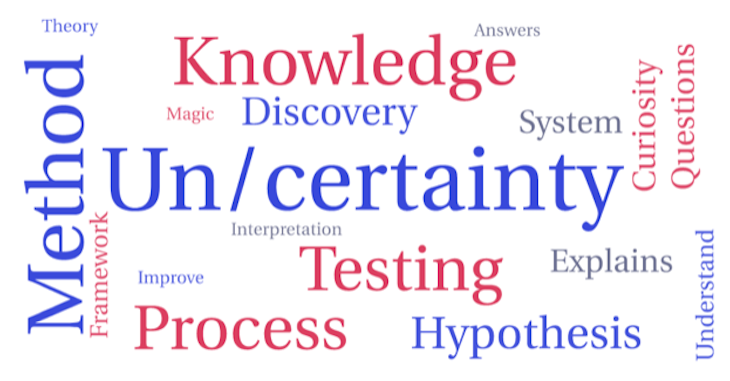Alice Fleerackers, Science in Society editor
When you think about the word “science,” what comes to mind? A body of knowledge? A method for gathering evidence? Or something else entirely?
As a science communication researcher, I talk, read, and write about the value of sharing science almost every day. But even though science is always on my mind, I’ve never really taken the time to understand what the term means. What are we actually talking about when we talk about “science”?
The power of a definition
The answer to this question seems simple but can raise thorny issues about whose knowledge is considered “credible” and who gets to call themselves an expert. Indigenous and Western knowledge, for example, are often viewed in binary – opposing rather than complementary systems of knowing – and are not always valued equally within academia and public policy. The same is true of the social sciences, humanities, and other “non-STEM” research areas.
How we think about science doesn’t just affect scientists, it also influences the way science is communicated in society. For example, female experts get less news coverage than their male colleagues, as do scientists from every other marginalized group. Within academic literature, historians of science communication have often overlooked knowledge-sharing practices from beyond the West, an issue that is only now being addressed in the scholarly community.
What is clear is that the way we define science matters. Official definitions of science vary widely and are often narrowly aligned with the views of the (typically white, male, and Western) scientists who pen them. All of this has made me think that it is time to leave the academic literature behind and consider some alternatives.
The many, wonderful ways to define science
To find those alternatives, I turned to Twitter, Facebook, and Slack to crowdsource definitions of the word “science.” Some of the 25+ definitions I received came from scientists and academics, others from science communicators and journalists, still others from people with no obvious connection to science at all – elementary school teachers, business owners, designers, and a puppeteer.
A favour for something I'm writing: In your own words, how do you define "SCIENCE"?
All definitions welcome – looking for a wide range of perspectives, so please RT!
(To contribute anonymously, click here: https://t.co/1VMSsPeAVg) pic.twitter.com/Inlpb2HCcQ
— Alice Fleerackers (@FleerackersA) May 17, 2021
Although by no means representative of the general population, these perspectives hint at the diversity of possible interpretations of what is (or could be) considered science. Some were funny, some profound, some were pure poetry. Collectively, they helped me think critically about how I define science and what this means for my own identity as a researcher, a science writer, and a citizen.
There were too many responses to include all of them in this post. Here is a selection of definitions I received that I think reflect the diversity of those responses:
“Science is a way for nerds fooling around to seem serious.”
“Contribution to the betterment of human, animal and plant life.”
“A way of approaching the world, using rigorous theorizing, testing and reiterating to figure out how things work!”
“Uncertainty is the seed of science. Curiosity its rain.”
“It’s a way of learning about the world through a collective, iterative process. Build on current knowledge to generate hypotheses, test those hypotheses, refute or support them, and then add to and build on the collective knowledge base.”
“Science is Gender Justice and Global Peace”
“Science is a highly nuanced form of doubt” – I can’t remember who said this, but it was from an episode of The Infinite Monkey Cage.”
“A never-ending pursuit to deepen the understanding of how the world works – driven by curiosity and a desire for continuous improvement.”
“Science (v): a process of asking questions about the natural & social world and trying to answer them. Science (n): a collection of ideas we have generated explaining natural and social phenomena using the process.”
“A system of methodologies seeking to confirm hypotheses. Most generally accepted means to seek for truths. Very long and boring research papers but interesting when simplified by Bill Nye.”
“The relentless pursuit of unattainable certainty.”
“Fact based truths without bias”
“Actual magic”
In many ways, these quotes echo the traditional definitions of science that emphasize its systematic nature as a method of gathering evidence. These definitions describe the process of science as relying on “rigorous theorizing, testing and reiterating” to “confirm hypotheses.” There is little discussion of gender or Indigenous perspectives, who is included or excluded from science, or what does or does not “count” as valid knowledge.
On the other hand, many of the responses highlight aspects of science that do not typically appear in more narrow definitions. These comments stress the connection between science and society, emphasizing the value of science communicators like Bill Nye, as well as the role science plays in “the betterment of human, animal and plant life” and the pursuit of global peace and social justice. Implicit in some of these definitions are beliefs about what motivates scientists to do their work: an innate sense of curiosity, a desire to learn, a goal of improving the world around them.
Finally, the third strain of definitions centres on the incomplete or mysterious nature of scientific work. These comments stress the inherent uncertainty that often drives scientific inquiry and the “nuanced form of doubt” that such inquiry produces. To me, this perspective seems to present a more humbling view of science and its role in society. Science is not portrayed as an all-knowing authority, nor a collection of important but “incomprehensible” evidence. Rather, it is described as just another useful – if imperfect – tool for questioning, learning, and wondering at the magic of the everyday.
~30~
How do you define science? If you’d like to join the conversation, you can share your thoughts on Twitter.




